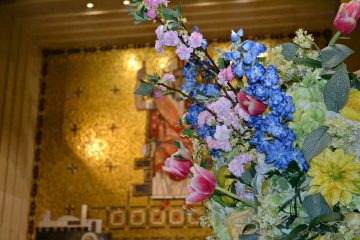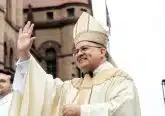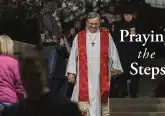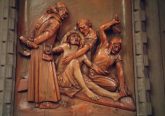Dominican theologian addresses New Evangelization during lecture
October 5, 2012
By Stephen Trosley
Admitting that the word “evangelism on the lips of Catholic is relatively new,” Archbishop Joseph Augustine Di Noia, OP, told more than 300 people attending the recent LeBlonde Lecture at the Athenaeum of Ohio/Mount St. Mary’s Seminary that the New Evangelization called for by Pope Benedict XVI is absolutely necessary.
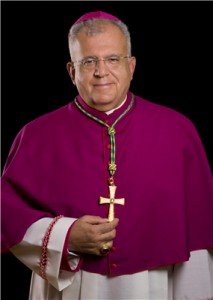
The Dominican theologian, currently serving as vice president of Ecclesia Dei and Secretary at the Congregation for Divine Worship and the Discipline of the Sacraments at the Vatican, said, “As Blessed John Pail II told is, the church must be evangelical to be the church.”
“We are instruments of divine agency,” he explained. “We’re not simply persuading others” (when we evangalize) he said. “We present the Gospel so that the spirit can work in them. We cannot change hearts. Only God can touch the heart.”
The archbishop explained that Blessed John XXIII was impressed with the charismatic movement when he encountered it in his travels and that the Vatican II council “embraced it.” He said after the Council and after “the furniture was moved around,” Pope Paul VI renewed the focus on evangelism. Subsequently, Blessed John Paul II and now Pope Benedict has again refocused the church on evangelization, putting it in the new context of urbanization and global communications.
Quoting the late theologian Cardinal Avery Dulles, archbishop Di Noia said evangelism must be Christ-centric, biblical and comprehensive. He departed from the flow of his lecture to explain that comprehensive was important. “It’s like asking an artist working on the small corner of a mural what’s going on in the rest of a large wall, and of course, he doesn’t know.” Di Noia said we must grasp the entire meaning of our faith, not just selected areas.
Later expanding on that principle, Di Noia said the “erosion of Catholic Faith and practice have become highly selective.” He spoke of the many priests and bishops he hears discussing the practice of cohabitation by couples prior to marriage who don’t realize there’s a prohibition of such practice and said “Thousands of couples are innocent of the fact that cohabitating outside of the sacrament creates a huge moral issue.”
“Secularization has taken root in the church,” he said. “We cannot not confront this.”
He explained that the Triune “God desires communion with creaturely persons. We could not know this if He did not tell us.”
The archbishop also addressed the nature of hell, the importance of liturgical practice and sacramental life. “This is critical. This is God acting in us. It’s not dispensable. It’s how we become more at home in the Trinitarian communion. We cannot become selective,” he said, noting that moral law developed to improve our fitness for communion with God.
He urged that Catholics recover the mystery of matrimony that symbolizes Christ’s love for His church and recover the Catholic devotional life. He reminded those at the lecture, which included many seminarians, clergy and religious, that the Year of Faith is about a “conversion of hearts.”
The LeBlond lecture was the first in a series of catechetical events planned for the Athenaeum during Year of Faith.








